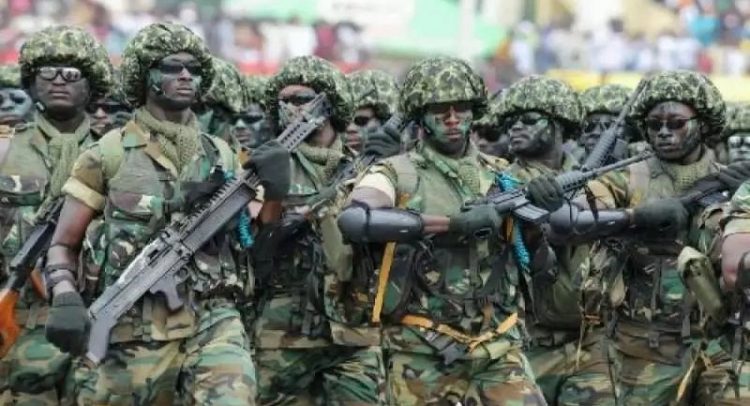RECENTLY, I joined two eminent Resource Persons for a workshop at the Kofi Annan International Peacekeeping Training Centre (KAIPTC) to discuss the subject “Constitutional Manipulation of Term Limits By Incumbent Governments In West Africa And Its Implications For Human Security.”
The high-calibre participants of about fifty were drawn from governmental institutions, CSOs and the private sector.
After my presentation, a participant asked me, “General, what has Ghana gained from coups since 1966-1979/1981?” This question immediately reminded me of my running-battle with Nana.
Nana
With his long association with military officers, Nana has been unrelenting in his demand that, I write to educate Ghanaians out of the “colonial-narrative” of the military being an unenlightened institution dedicated to terrorising civilians, a view unfortunately, reinforced by the actions of a few soldiers, and the history of atrocities during coup-d’états/revolutions.
He opines an educational drive led by the Directorate of Public Relations (DPR) is necessary as most civilians know very little about the military.
So, when unexpectedly, my “old-man” also suggested I write about the advantages/disadvantages of military rule in Ghana, I requested him to give me some benefits from 1966-1979/1981. Again, I asked if violently overthrowing a democratically elected government in a coup-d’état could be justified/sanitised by any advantages.
Conceding that violence is wrong, his counter-attack was, how about when presidents perpetuate themselves by amending the Constitution into a “democratic dictatorship?”
Prof Samuel Huntington
The renowned Harvard professor Samuel Huntington, in his book “The Soldier and the State”, states that, “The modern officer corps is a professional body, and the modern officer a professional man.”
He explains that using the three criteria in determining what a profession is, viz expertise, responsibility and corporate-ness, the military meets all. Firstly, the military has expertise in managing violence. Secondly, in terms of social responsibility, financial remuneration is not the primary aim of the military. Thirdly, the military has standards for admission/competencies required to be exhibited.
A distinction is made between disciplined “officers,” and undisciplined “amateurs” in uniform who engage in violence, including coup-d’états!
Individual-Gain
Contrary to what most Ghanaians think, unlike Myanmar or Pakistan, the military as an institution in Ghana, does not stage coups. It is individuals in the military who stage coups for their personal benefit, and drag the institution into politics! The impression therefore, that the military is a “coup-making machine” is wrong/unfortunate!
A disciplined officer knows his role in the military is to defend the state, and not to rule. Indeed, nothing stops a serving officer from resigning to pursue a political career. Using the military as a short-cut to political power is indefensible!
The state/politicians must also recognise/respect the military an important merit-based institution, as happens in civilised countries, capable of self-regulation, and must not meddle in its running.
1966
24th February, 1966 is a significant date in Ghana’s history. Co-incidentally, on 24th February, 2022, on the 56th anniversary of Ghana’s coup, Russia invaded Ukraine.
Declassified documents, thirty years after the event, indicated an external power’s complicity in the overthrow of Osagyefo Dr. Kwame Nkrumah on 24 February, 1966. Feeding on Osagyefo’s penchant for showmanship/grand projects, he was lured to go to Viet-Nam to broker peace in the US-Viet-Nam war.
Once Osagyefo was out of Ghana, Col (later Gen) E.K. Kotoka, Commander 2 Infantry Brigade, Kumasi and his Brigade-Major, Major A.A. Afrifa (later Gen), staged Ghana’s first coup-d’état on 24 February, 1966.
In the bloody coup, the Army Commander, Major-General Charles Mohammed Barwah, was killed together with soldiers guarding him.
1967
On 17th April, 1967, soldiers from the 2 Recce Squadron, Ho, staged an unsuccessful counter-coup in Accra during which Gen Kotoka was killed. The leaders of the coup Lt S.B. Arthur and Lt Moses Yeboah were executed by firing squad while 2/Lt Osei-Poku was sentenced to thirty years’ imprisonment.
1972
Following his 13th January, 1972 bloodless coup which overthrew Dr. Busia’s Second-Republic, Lt Col (later Gen) Acheampong has been credited with infrastructural development like the Kpong Dam, El Wak Stadium and Dansoman Estates, etc. ‘Operation Feed Yourself’ which saw Ghana as a net exporter of rice is touted a great achievement.
The fact still remains that he overthrew a democratically elected government.
1979/1981
The 4th June, 1979/31st December, 1981 coup/revolution and the aftermath, have been the bloodiest in Ghana’s history with the clarion call “let the blood flow!” Generals were executed, judges were murdered and ordinary people were killed. Collateral/psychological damage and dislocation to families remain incalculable.
While some are ambivalent about 1979 because the coup overthrew a military regime and was only “soldiers killing themselves,” 31st December, 1981 was the overthrow of a democratically elected government of President Hilla Limann’s 3rd Republic.
In any case, did the killings in 1979/1981 stop corruption? As the questioner asked, what has Ghana gained from coups?
Summary
For any Ghanaian who has not seen or been at the receiving end of a coup-d’état, the last wish should be for one! In the idealistic world of theory where no weapons are fired, violence can be glamourised/fantasised as an academic exercise. The reality is that, once violence starts, it knows no bounds.
Somehow, there is restraint/fear in talking about the 1979/1981 violent coup/revolution whose legacy of indiscipline, impunity, intolerance, disrespect and corruption have become our national ethos. Beneficiaries therefore flaunt their gain shamelessly.
So long as infrastructure like airports, roads, institutions, etc, remain named after coup-makers, what message is being sent to the younger generation of Ghanaians?
In England, nothing is named after the 1648 “prototype coup-maker” and executioner of King Charles 1, Oliver Cromwell.
And politicians, why don’t you demonstrate integrity, and also stop using the military as an employment avenue for unqualified family and friends, devaluing the institution, such that the thought of it, as a “coup-making-machine” doesn’t occur to any adventurous Ghanaian?
Leadership, lead!
BY Brig Gen Dan Frimpong (Rtd)
dkfrimpong@yahoo.com


